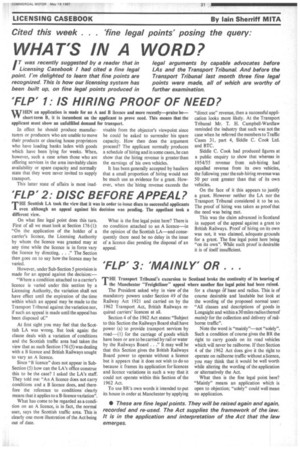'FLP' 3: 'MAINLY' OR
Page 33

If you've noticed an error in this article please click here to report it so we can fix it.
THE Transport Tribunal's excursion to Scotland broke the continuity of its hearing of the Manchester "Freightliner" appeal where another fine legal point had been raised. The President asked why in view of the for a change Of base and radius. This is of
mandatory powers under Section 49 of the Railway Act 1921 and carried on by the 1962 Transport Act, British Railways required carriers' licences at all.
Section 4 of the 1962 Act states: "Subject to this Section the Railways Board shall have power (a) to provide transport services by road—(1) for the carriage of goods which have been or are to be carried by rail or water by the Railways Board. . ." It may well be that this Section gives the British Railways Board power to operate without a licence but it appears that it does not wish to do so because it frames its application for licences and licence variations in such a way that it could not operate within this Section of the 1962 Act.
To use BR's own words it intended to put its house in order at Manchester by applying course desirable and laudable but look at the wording of the proposed normal user: "Ail classes and descriptions of goods in Longsight and within a 30 miles radius thereof mainly for the collection and delivery of railborne traffic".
Note the word is "mainly"—not "solely". Such a condition of course gives the BR the right to carry goods on its road vehicles which will never be railbome. If then Section 4 of the 1962 Act does give it the right to operate on railborne traffic without a licence, you may think that it would be well worth while altering the wording of the application or alternatively the Act.
What then is the fine legal point here? "Mainly" means an application which is open to objection; "solely" could well mean no application.




















































































































